
Restorative Dentistry Aurora
How We Repair Your Damaged Teeth
At some point in your life, you will likely need some kind of restorative dentistry care. Fillings, crowns, inlays, onlays…these are all common procedures used to increase the strength and function of your teeth when damage has occurred. The earlier we can intervene in the case of a cavity, infection, or dental injury, the more likely we are to achieve good results and save your teeth.
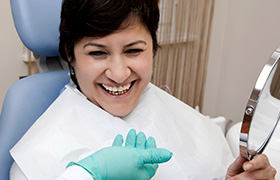
If you’ve got a cavity, we will provide a dental filling. Left unabated, a cavity can eventually lead to serious infection and, even worse, the loss of a tooth. We use composite tooth-colored material to create cosmetic dental fillings when desired and possible.
Porcelain crowns, inlays, and onlays provide extra strength and protection for teeth that have more extensive damage or are broken.
We also offer root canal therapy. When an infection has reached the nerve that runs through your tooth root, root canal therapy removes the diseased nerve, cleanses the canal, and fills it to stop the infection. Oftentimes, root canal therapy can save teeth that might otherwise have been lost, keeping your smile in tip top shape.
Teeth Replacement Options in Aurora

Mauck & Ricci, DDS offers many options for replacing missing teeth. If you’ve lost one tooth, several teeth, or need to replace all of your teeth, we want you to know that replacement is a top oral health priority. Sure, having a complete smile is more aesthetically pleasing, but it’s also better for your overall wellbeing, keeping other teeth from shifting or also being lost. Our tooth replacement options include:
- Crown and Bridgework
- Dentures and Partials
- Dental Implants
And if you need several restorative dentistry procedures in combination to bring your damaged smile back to life, Drs. Mauck and Ricci can perform a full-mouth reconstruction.
Dental Crowns & Bridges
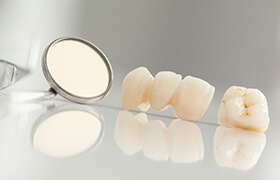
Dental crowns and bridges are two of the most reliable and trusted treatments in all of dentistry. A dental crown can be used to restore a broken, decayed, or misshapen tooth, which a bridge can be used to replace a single tooth or even a few in a row. To learn more, simply click on the link below.
Learn More About Crowns & Bridges
Full & Partial Dentures
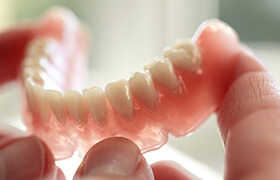
Dentures, in one form or another, have been used for generations to quickly and effectively replace multiple missing teeth. Now, modern-day dentures are smaller, sleeker, and more natural-looking than ever. They are made of prosthetic teeth attached to a natural-looking gum-colored base, and there are two main types.
A partial denture is used to replace multiple missing teeth that are located throughout the mouth. They basically fit among the remaining teeth like the missing piece of a puzzle, and they are held in place using small metal clasps that attach to neighboring teeth.
If you have an entire row of missing teeth, a full denture can be used to restore it. This sits directly on the gums and is held in place using natural suction and/or a small amount of denture adhesive.
Learn More About Full & Partial Dentures
Root Canal Therapy
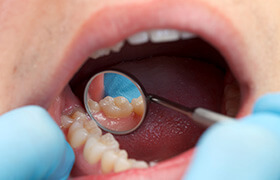
Root canal therapy is used to treat teeth that have damage or an infection deep within their innermost layer, which is known as the dental pulp. This pulp contains a number of things, such as the nerve of the tooth, which is why anything affecting it can cause so much pain. Despite its dubious reputation, root canal therapy is actually one of the best tools we have to relieve severe dental pain and save teeth that would otherwise need to be extracted.
When you come in for root canal therapy, your dentist will start by thoroughly numbing the area to ensure your comfort. Then, they’ll create a small access hole to reach the pulp, remove the damaged tissue, clean the area, and then place a medicated packing into the tooth. At a follow-up appointment the tooth will be full restored using a dental crown.
Tooth Extractions
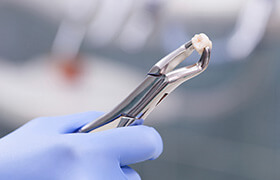
Our number one goal is to preserve as much of your natural smile as we can, but sometimes, the best course of treatment may involve removing a tooth. This may be the case if:
- A tooth is too damaged to be repaired
- Advanced gum disease has broken down the bone supporting a tooth
- Room needs to be created for orthodontic treatment
- Room needs to be created for a partial or full denture.
- A weakened tooth needs to be replaced with a dental implant
Learn More About Tooth Extractions
Sleep Apnea Therapy

If you currently suffer from sleep apnea, we can provide you with simply, easy to use treatment using an approach called oral appliance therapy. For this, you’ll wear a custom-made mouthpiece to bed each night, and it will keep your airway open by slightly shifting your jaw forward. This treatment is much more comfortable than a traditional CPAP machine, and it can even be used to help those who want to stop snoring.
Learn More About Sleep Apnea Therapy
Sedation Dentistry

If you’re one of the millions of people who is afraid of going to the dentist, don’t worry, you’re far from alone! If you need a little extra help to feel comfortable in the treatment chair, we can offer you two kinds of sedation. With nitrous oxide, you’ll simply need to breathe in an odorless gas, and within a minute, you’ll feel a warm, relaxing sensation come over you.
Or, if your nerves are a little stronger, we can offer you oral conscious sedation, in which you’ll take a pill before your appointment so that by the time you sit in the chair, you’ll be completely physically and mentally relaxed.